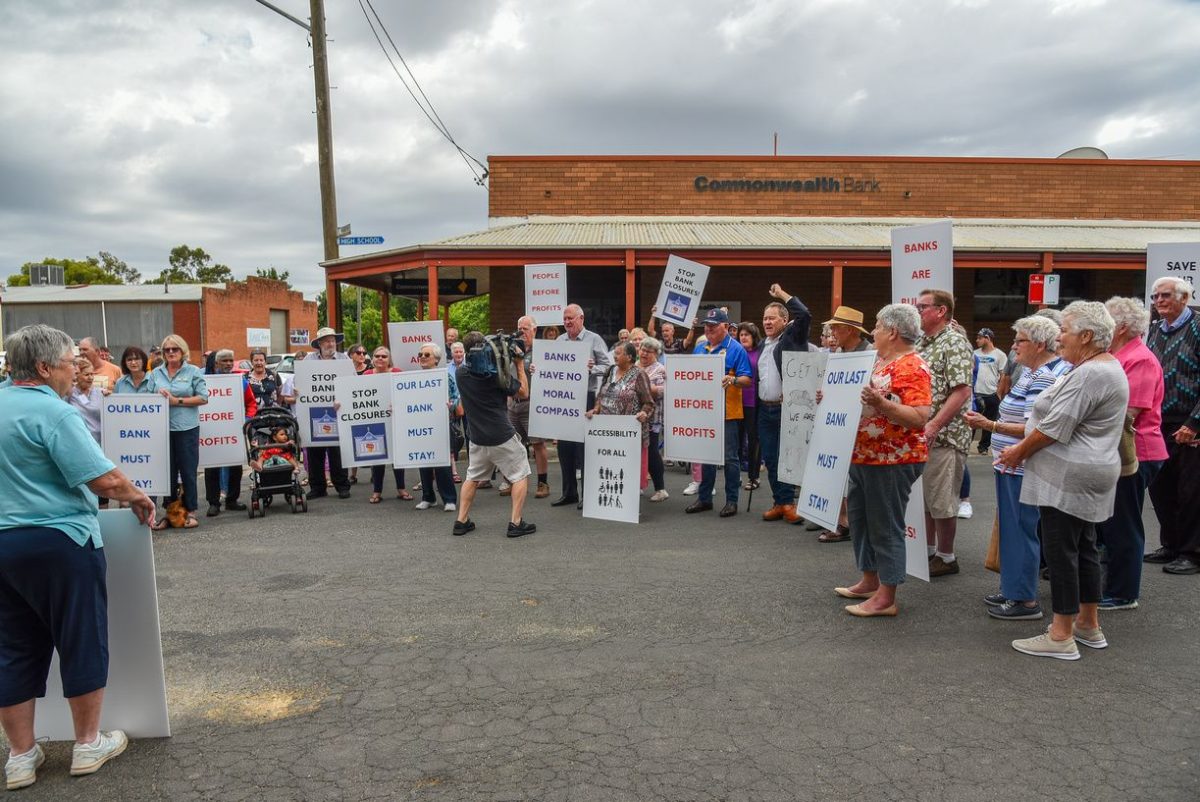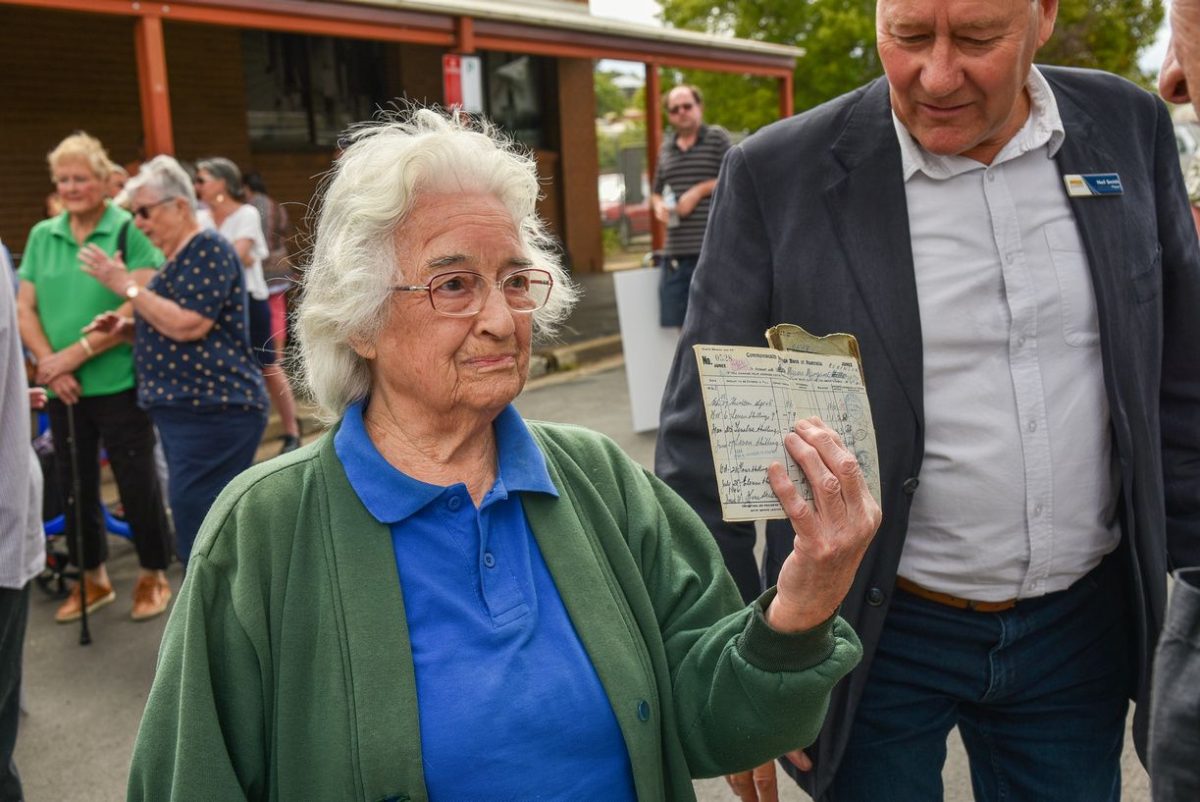
Junee residents protest against the Commonwealth Bank’s branch closure early last year, which resulted in the organisation halting all planned shutdowns. Photos: Struan Timms Photography.
A Senate committee will hold its last public hearing in Canberra today (25 March) to examine the impact of bank branch closures in regional areas.
In the past three years, more than 600 towns have been left without a banking service.
The Australian Prudential Regulation Authority (APRA) said that since 2017, there has been a 37 per cent reduction in bank branches across the country.
In the year to 30 June 2023, another 11 per cent shut down, of which 7 per cent were in regional and remote areas.
A recent RMIT and Swinburne University submission to the inquiry noted that, despite improvements, regional areas exhibited lower digital inclusion scores across access, affordability and digital ability compared with the national average and metropolitan areas.
It added that closures were likely to particularly impact older people and First Nations communities living in regional Australia as they were heavily reliant on face-to-face services for financial transactions and personalised support.
Australian Small Business and Family Enterprise Ombudsman Bruce Billson said in his submission that closures encouraged businesses to operate outside the regulated banking sector, increased small-business administrative costs and took customers away from towns.
And when NBN outages occurred during disasters or infrastructure problems, online banking services were rendered useless. The reliance on cash for goods and services would not be sufficiently met in the absence of a branch, Bank@Post or private ATM.
Mr Billson said small businesses found it difficult to source locally relevant, professional financial advice and had restricted timely access to capital, which was crucial for their optimal performance.
Today’s hearing is the penultimate for the Rural and Regional Affairs and Transport References Committee, which was referred to the matter after the Regional Banking Taskforce handed down its recommendations in late 2022. The committee has been tasked with considering the extent and reason for the bank branch closures, along with solutions to resolve their impact on the economy and welfare of customers in regional communities.
In correspondence with committee chair Senator Matthew Canavan, the National Australia Bank (NAB) said it was losing regional branches as more than 93 per cent of its customer interactions now occurred through digital channels.
“We are changing the way we do business to adapt to this changing customer behaviour,” the statement reads.
“This reshaping process includes making difficult decisions to close parts of the NAB branch network that are no longer able to be readily staffed, where customer visitation numbers are extremely low or where a landlord may seek an alternative tenant in premises we do not own.”

At the protest against the Commonwealth’s branch closure, Maisie Robinson shows the passbook for the account she opened in Junee in 1943.
NAB has adopted all the taskforce recommendations and said regional banking could occur through major regional centres, post offices and ATMs. The three other big banks hold similar positions on the matter.
However, in a letter to NAB chair Phillip Chronican, Cootamundra-Gundagai Mayor Charlie Sheahan said the recent closure of its branch in September flew in the face of the bank’s good intentions.
“It would appear to those of us who live in regional NSW that decisions made by banks to remove rural branches across regional Australia have shown disdain and little respect for their customers who choose to live in country towns,” Mayor Sheahan said.
“Also, no consideration at all has been given to the large increase in numbers of residents moving from the city to the country in recent years, with Gundagai being a perfect example of the transforming tree change demographic.”
Cr Sheahan said he was appalled there was no opportunity for community consultation before the closure, especially at a time when mental health issues were at record levels in NSW regional towns.
“The provision of face-to-face services is regularly being downgraded or removed completely,” he said.
“This obvious strategy of forcing customers to take up online services or attend the local post office is truly unsettling and is another outrageous example of cost-shifting impacting our communities.”
Cr Sheahan said the factsheet provided by NAB advised customers to access their local post office or local branch services in Wagga Wagga (83 kilometres away) and Cootamundra (60 kilometres away).
“We appreciate the wonderful role Australia Post plays in rural towns but it is obviously not a viable alternative to any acceptable idea of a bank service,” he said.
At the December hearing, Australia Post managing director Paul Graham said while his organisation was prepared to provide basic banking services, “post offices are not suitable for a bricks-and-mortar bank, and the scope of services available through Bank@Post is not currently suitable for all customers”.
Mr Graham acknowledged Australian Post’s significant investments into lifting the capability of local participating Bank@Post offices, especially when they were the only physical banking services providers in a community. However, they were not banks and were not licensed as authorised deposit-taking institutions (ADIs).





